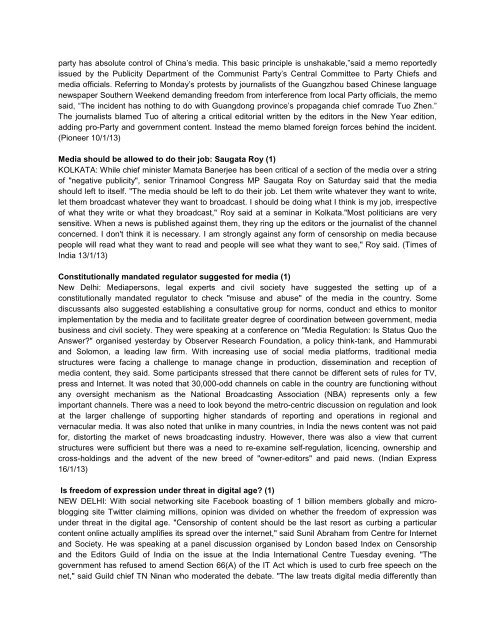MEDIA/FREEDOM OF PRESS - 2013 - Indian Social Institute
MEDIA/FREEDOM OF PRESS - 2013 - Indian Social Institute
MEDIA/FREEDOM OF PRESS - 2013 - Indian Social Institute
Create successful ePaper yourself
Turn your PDF publications into a flip-book with our unique Google optimized e-Paper software.
party has absolute control of China’s media. This basic principle is unshakable,”said a memo reportedlyissued by the Publicity Department of the Communist Party’s Central Committee to Party Chiefs andmedia officials. Referring to Monday’s protests by journalists of the Guangzhou based Chinese languagenewspaper Southern Weekend demanding freedom from interference from local Party officials, the memosaid, “The incident has nothing to do with Guangdong province’s propaganda chief comrade Tuo Zhen.”The journalists blamed Tuo of altering a critical editorial written by the editors in the New Year edition,adding pro-Party and government content. Instead the memo blamed foreign forces behind the incident.(Pioneer 10/1/13)Media should be allowed to do their job: Saugata Roy (1)KOLKATA: While chief minister Mamata Banerjee has been critical of a section of the media over a stringof "negative publicity", senior Trinamool Congress MP Saugata Roy on Saturday said that the mediashould left to itself. "The media should be left to do their job. Let them write whatever they want to write,let them broadcast whatever they want to broadcast. I should be doing what I think is my job, irrespectiveof what they write or what they broadcast," Roy said at a seminar in Kolkata."Most politicians are verysensitive. When a news is published against them, they ring up the editors or the journalist of the channelconcerned. I don't think it is necessary. I am strongly against any form of censorship on media becausepeople will read what they want to read and people will see what they want to see," Roy said. (Times ofIndia 13/1/13)Constitutionally mandated regulator suggested for media (1)New Delhi: Mediapersons, legal experts and civil society have suggested the setting up of aconstitutionally mandated regulator to check "misuse and abuse" of the media in the country. Somediscussants also suggested establishing a consultative group for norms, conduct and ethics to monitorimplementation by the media and to facilitate greater degree of coordination between government, mediabusiness and civil society. They were speaking at a conference on "Media Regulation: Is Status Quo theAnswer?" organised yesterday by Observer Research Foundation, a policy think-tank, and Hammurabiand Solomon, a leading law firm. With increasing use of social media platforms, traditional mediastructures were facing a challenge to manage change in production, dissemination and reception ofmedia content, they said. Some participants stressed that there cannot be different sets of rules for TV,press and Internet. It was noted that 30,000-odd channels on cable in the country are functioning withoutany oversight mechanism as the National Broadcasting Association (NBA) represents only a fewimportant channels. There was a need to look beyond the metro-centric discussion on regulation and lookat the larger challenge of supporting higher standards of reporting and operations in regional andvernacular media. It was also noted that unlike in many countries, in India the news content was not paidfor, distorting the market of news broadcasting industry. However, there was also a view that currentstructures were sufficient but there was a need to re-examine self-regulation, licencing, ownership andcross-holdings and the advent of the new breed of "owner-editors" and paid news. (<strong>Indian</strong> Express16/1/13)Is freedom of expression under threat in digital age? (1)NEW DELHI: With social networking site Facebook boasting of 1 billion members globally and microbloggingsite Twitter claiming millions, opinion was divided on whether the freedom of expression wasunder threat in the digital age. "Censorship of content should be the last resort as curbing a particularcontent online actually amplifies its spread over the internet," said Sunil Abraham from Centre for Internetand Society. He was speaking at a panel discussion organised by London based Index on Censorshipand the Editors Guild of India on the issue at the India International Centre Tuesday evening. "Thegovernment has refused to amend Section 66(A) of the IT Act which is used to curb free speech on thenet," said Guild chief TN Ninan who moderated the debate. "The law treats digital media differently than
















